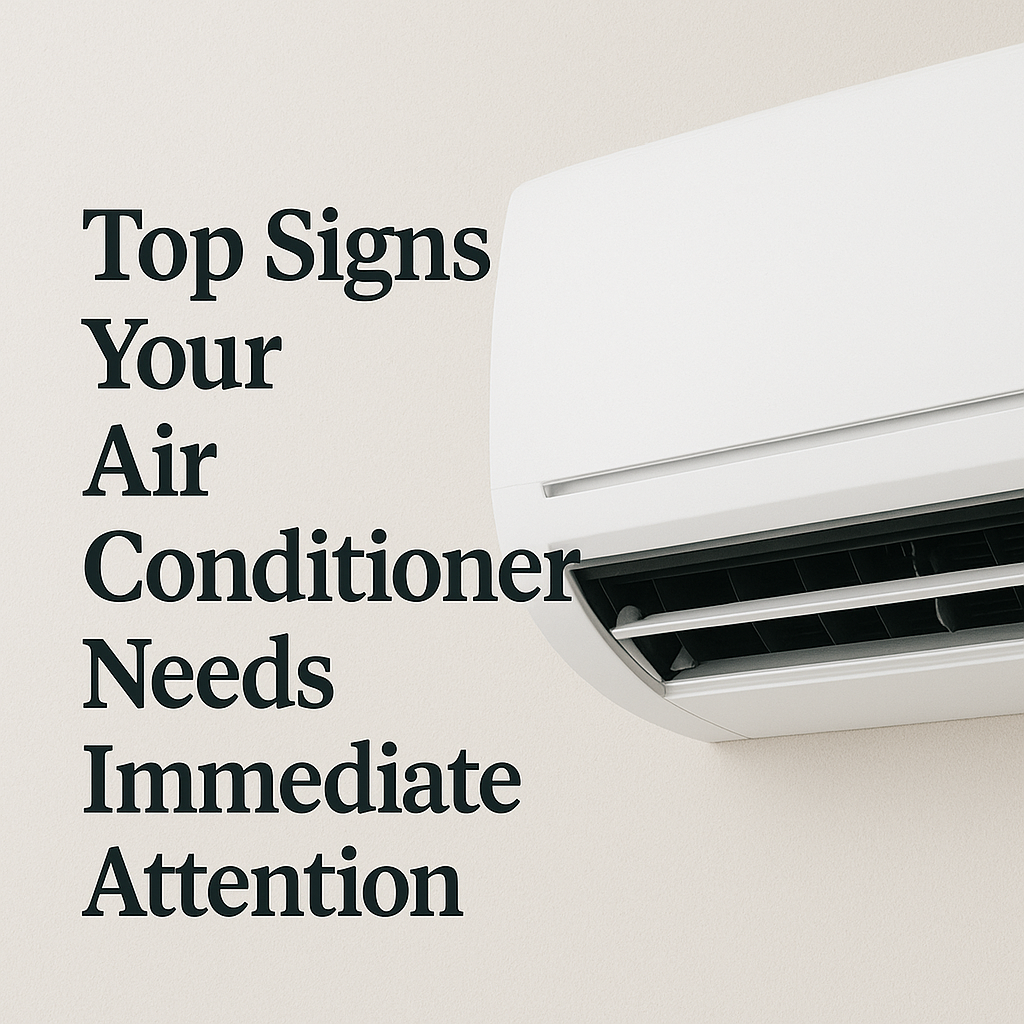A well-functioning air conditioner is crucial for comfort during hot seasons. Yet, like any mechanical system, it can give off warning signs before a major breakdown. Ignoring these early signals could lead to expensive repairs or even a complete system failure. Below, we highlight the top signs your air conditioner needs immediate attention, helping you avoid costly downtime and ensuring your home stays cool and efficient.
Unusual Noises Coming from the Unit
If your air conditioner starts making banging, grinding, screeching, or rattling sounds, this is a clear indicator that something is wrong. These noises often point to:
- Loose or broken components
- Fan motor issues
- Debris stuck in the unit
- Worn-out belts or bearings
No AC should be excessively loud during operation. If you hear anything that sounds out of the ordinary, turn off the system immediately and contact a professional for diagnostics.
Weak or Warm Airflow
When your vents start pushing out warm or barely noticeable air, it’s a sign your system is struggling to cool. This issue may be caused by:
- Low refrigerant levels
- Clogged filters
- Compressor failure
- Blocked or leaky ductwork
A weak airflow compromises energy efficiency and comfort, which means your system is running harder for less output — an expensive and ineffective situation.
Foul or Musty Odors
A properly functioning AC should never emit strange smells. If you’re experiencing musty, burnt, or chemical-like odors, you may be dealing with:
- Mold or mildew buildup in the ductwork or evaporator coil
- Burning electrical components
- Contaminated air filters
These issues can affect indoor air quality and lead to health hazards. Acting fast is essential, especially in households with asthma or allergy sufferers.
Frequent Cycling or Constant Running
If your AC cycles on and off too frequently or runs continuously without reaching the desired temperature, it might indicate:
- A malfunctioning thermostat
- Improperly sized unit
- Dirty condenser coils
- Refrigerant issues
Both short cycling and constant operation increase wear and tear on the system, significantly reducing its lifespan and efficiency.
Water Leaks or Ice Formation
Spotting water pooling around your AC or seeing ice buildup on the coils is never a good sign. Common causes include:
- Clogged or broken condensate drain lines
- Frozen evaporator coils
- Low refrigerant levels
- Blocked airflow
These issues can lead to structural damage in your home and mold problems if left unresolved.
Spike in Energy Bills
An unexpected surge in your monthly energy bill, without a change in usage patterns, is a telltale sign your AC is not running efficiently. Possible reasons:
- Dirty filters reducing airflow
- Aging components
- System strain from malfunctioning parts
When your AC works harder to deliver the same cooling, it drains more energy, translating into higher utility costs.
Unresponsive Thermostat
The thermostat is the brain of your air conditioning system. If your system doesn’t respond to thermostat adjustments, or if rooms feel unevenly cooled, the issue may be:
- Faulty thermostat sensors
- Electrical issues or poor calibration
- Disconnected wiring
A non-functional thermostat makes it impossible to maintain indoor comfort and puts your system at risk for overuse and breakdowns.
Blowing Hot Air
If your AC starts blowing hot air, especially in the middle of summer, this is an emergency. It could be due to:
- Compressor malfunction
- Refrigerant leaks
- Thermostat errors
Blowing hot air is a sign the cooling cycle is compromised — a problem that requires professional service immediately.
Age of the Air Conditioner
If your air conditioner is more than 10–15 years old, and you’re experiencing frequent repairs, it might be more cost-effective to replace it. Older units are:
- Less energy-efficient
- More prone to breakdowns
- Often incompatible with modern smart thermostats
Upgrading to a newer model can save you on monthly costs, improve indoor air quality, and eliminate constant repair worries.
Electrical Issues or Tripping Breakers
Frequent tripping of circuit breakers when the AC turns on indicates electrical problems. These might be caused by:
- Faulty wiring
- Compressor malfunction
- Overloaded circuits
Electrical issues can become fire hazards if not promptly addressed. Never ignore this warning sign — call a licensed technician without delay.
Visible Damage or Rust
If you notice corrosion, rust, or physical damage to your air conditioner, especially on the outdoor unit, it’s time for an inspection. Exposure to the elements over time can deteriorate:
- Compressor casing
- Condenser coils
- Refrigerant lines
Rust and corrosion weaken the unit’s performance and lead to expensive repairs if left untreated.
System Doesn’t Turn On
This is the most obvious sign that your air conditioner needs immediate professional attention. If your AC doesn’t turn on at all, possible culprits include:
- Capacitor or contactor failure
- Tripped breaker or blown fuse
- Faulty thermostat
- Dead compressor
Rather than guessing the issue, schedule a service call immediately to avoid further complications.
Final Thoughts: Early Detection Saves Time and Money
Catching these signs early can prevent major system failures and expensive emergency repairs. Regular maintenance checks, changing filters, and professional inspections can help you detect minor issues before they spiral into large problems.
Your AC is more than just a convenience — it’s essential for comfort, safety, and even health. Don’t wait for a complete breakdown. At the first sign of trouble, take action immediately.

